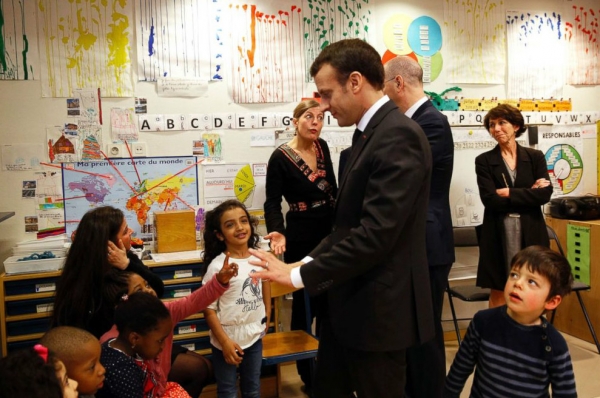However, observers say it is more of a symbolic gesture, as the vast majority of parents in France already enroll their children in an école maternelle (preschool) from the age of three, taking advantage of the free system.
So why the change?
The decision “reflects the president's desire to make school the place of real equality and is recognition that the ecole maternelle should no longer be considered as just a form of day care or preparation for elementary school, but as a real school, focused on the acquisition of language and the development of the child," the Elysée Palace explained in a statement.
In the 2015-2016 school year, almost 98% of three-year-olds in France were enrolled at school, but there were significant differences across the country.
In Paris, 93 percent of three-year-olds were in school, while the rate was 87 percent in Corsica and 70 percent in France’s overseas territories, according to official figures cited by The Local.
Speaking on Tuesday, Macron, who has named education as one of the priorities of his term, said he hoped the new measure would “correct this unacceptable differential.”
Taking to Twitter following the announcement, the president shared a list of children's opinions on the benefits of attending school, which included the opportunity for learning, eating in the cantine and playing.
How does it compare to the rest of Europe?
The move by Macron will give France the lowest age for beginning compulsory schooling in Europe, according to data from the European Commission.
Northern Ireland requires children to start compulsory education at the age of four, while in Cyprus it begins when children are aged four and eight months, according to the 2014-2015 data.
The majority of countries in Europe require children to begin their schooling at age five or six.
The Finland example
In several European countries, compulsory education does not begin until children are seven years old.
This is the case in Finland, whose education system routinely tops European and global rankings.
“In Finland there are certainly not any arguments to say that starting formal school earlier than the age of seven would be good for children’s achievement later in school,” Finnish education expert Pasi Sahlberg told Euronews.
Finnish children have a half day of compulsory preschool at the age of six, which Sahlberg said is mostly play-based and focused on boosting social skills and identifying any learning or developmental difficulties that may later arise.
“There is a universal reason for a later school starting age that is explained by children’s developmental age to be able to learn abstract and conceptual things, like reading and mathematical ideas,” Sahlberg explained.
Benefits or drawbacks?
There is debate over what age children should start their formal education, and how learning should be conducted in early years.
Euronews asked education experts what they thought of France's decision.
Focus on play
Sahlberg said that if the first three years of compulsory schooling in France were based on “play, physical activity, music, arts, and helping children to develop healthy levels of self-awareness and good social skills” it could be "highly beneficial".
“Research is very clear that helping children to develop these skills and habits of mind through play in early years is associated to better wealth, well-being, creativity and self-control in later years,” he said.
However, he noted that any efforts to make early childhood education like a “new primary school” would be a “big mistake”.
'Formal learning too early can be boring'
Lord Jim Knight of digital education company Tes agreed that the decision to start compulsory schooling at three could be "a great progressive move, depending on the curriculum."
"For many parents, a safe educational provision for their children is welcome, releasing them to do other work. However, the evidence from successful Scandinavian countries is that the early years education should focus on teaching social skills and learning through play," he said.
"I do not believe it should focus too early on core skills such as literacy and numeracy. Formal learning too early can be boring and put off children from school, especially boys."
Focus on quality teachers
Yoshie Kaga, an education specialist at UNESCO, said compulsory schooling from such a young age could be positive if conducted by well-trained teachers with opportunities for indoor and outdoor learning, and a curriculum supporting their development.
She noted that it could be particularly beneficial for children whose families were not be able to offer the same care or education at home, or for those who communicated in a different language outside of school.
However, she said that if the preschool education and care was of a low quality, it would be better for children to stay at home.
She added that for families that have opted not to send their children to preschool until now, it might be difficult to adjust to the new rules.
“They might feel attached to their young children, they might feel that from their cultural perspectives, families should stay with very young children."







